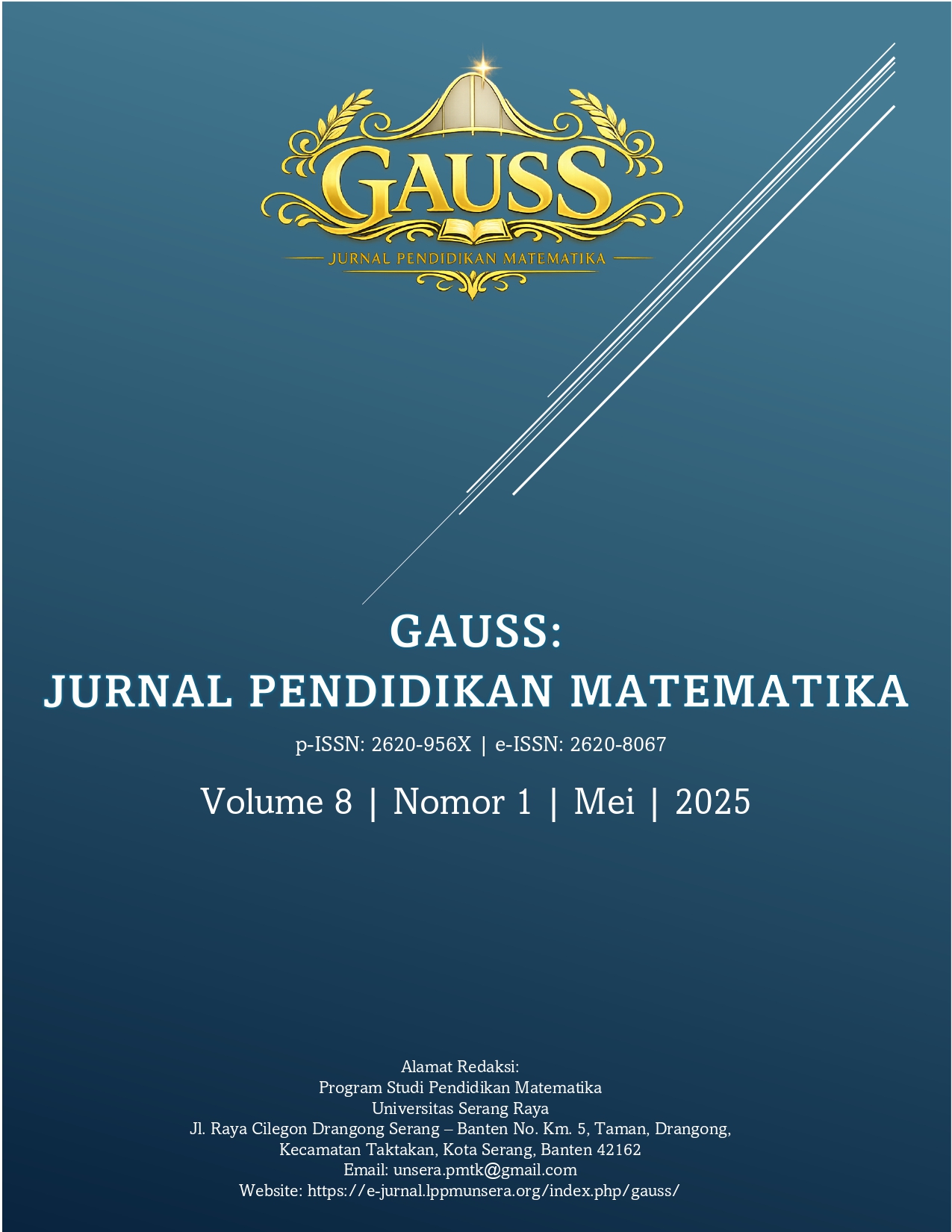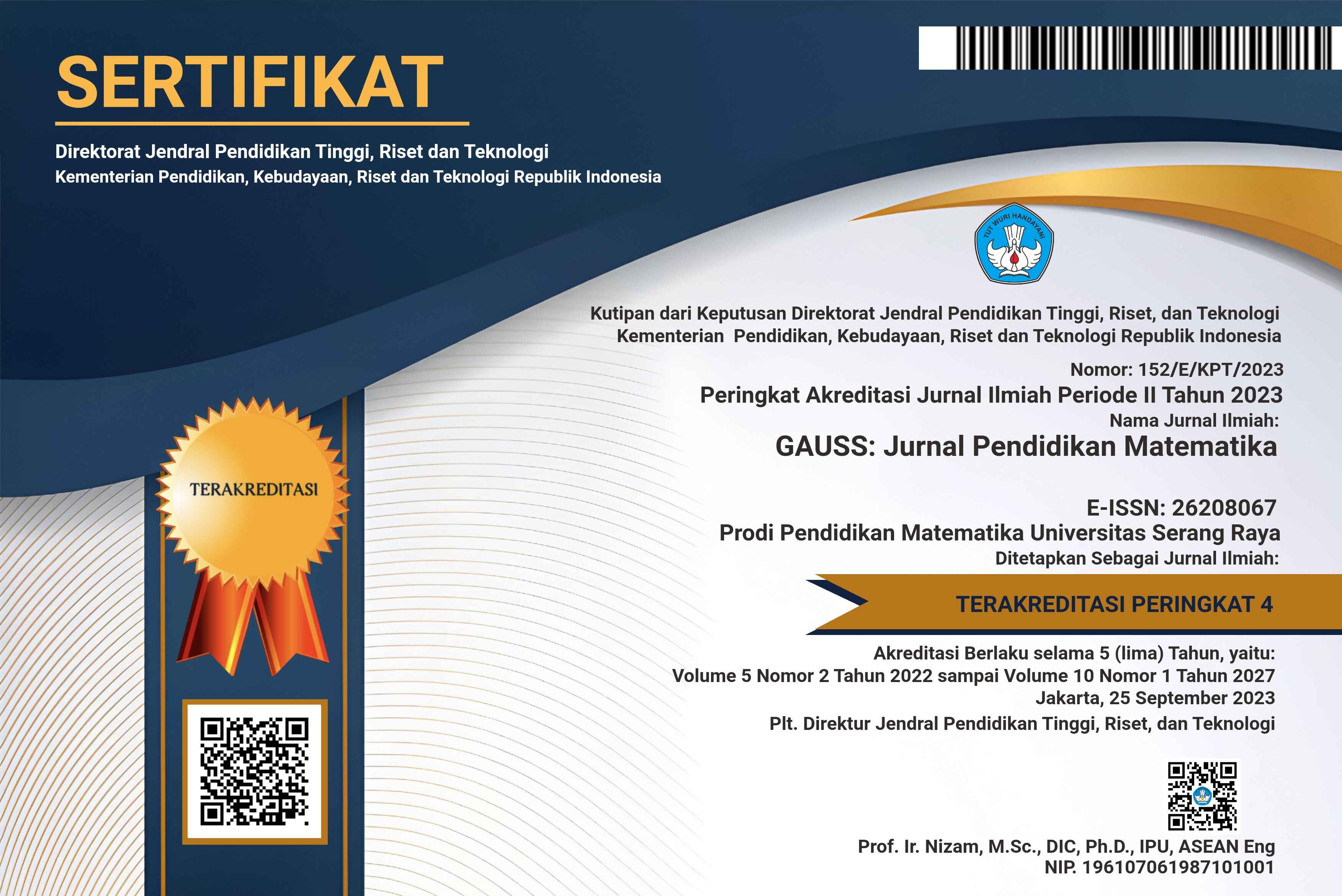The Effectiveness of Hybrid Learning on Student Learning Outcomes in Number Theory
DOI:
https://doi.org/10.30656/gauss.v8i1.10452Abstract
Abstrak
Pada tahun 2022 kasus COVID-19 mengalami penurunan yang signifikan dibandingkan tahun 2021 sehingga menyebabkan berbagai lembaga baik sekolah maupun perguruan tinggi mempertimbangkan untuk dapat menyelenggarakan pembelajaran tatap muka. Pembelajaran hybrid merupakan model pembelajaran terkini di masa pandemi dan memadukan teknologi terkini. Pembelajaran daring kemudian dilanjutkan dengan metode konvensional (luring). Penelitian ini bertujuan untuk melihat efektivitas pembelajaran hybrid terhadap hasil belajar mahasiswa pada mata kuliah teori bilangan. Metode penelitian yang digunakan adalah penelitian eksperimen semu. Populasi dalam penelitian ini adalah seluruh mahasiswa semester genap tahun ajaran 2021/2022. Sampel yang diambil berasal dari dua kelas dengan jumlah keseluruhan 35 mahasiswa. Teknik pengambilan sampel yang digunakan adalah purposive sampling berdasarkan pertimbangan dosen teori bilangan, analisis data menggunakan software SPSS, dan menggunakan uji-t sampel independen. Berdasarkan hasil perhitungan analisis data menggunakan SPSS, pembelajaran hybrid terhadap hasil belajar mahasiswa teori bilangan dengan menggunakan pembelajaran konvensional tidak efektif. Pembelajaran hybrid tidak dapat dijadikan model pembelajaran alternatif di era pasca pandemi COVID-19 karena pembelajaran hybrid tetap menggunakan pembelajaran konvensional, meskipun diawali dengan pemanfaatan teknologi seperti pembelajaran daring.
Kata Kunci: Hasil belajar, Matematika, Teori Bilangan, Pembelajaran Hybrid.
Abstract
In 2022, cases of the COVID-19 virus have significantly decreased compared to 2021, and this has caused various institutes, both schools and universities, to consider being able to learn face-to-face. Hybrid learning is the latest learning model during the pandemic and integrates the latest technology. Learning online and then continuing with conventional methods (offline). This research aims to see the effectiveness of hybrid learning on student learning outcomes in number theory. The research method used is quasi-experimental research. The population in this study were all even-semester students in the 2021/2022 semester 2. The samples taken were from two classes with 35 students. The sampling technique used was purposive sampling based on considering the number theory lecturer, data analysis using the Software SPSS, and using the independent sample t-test. Based on the results of data analysis calculations using SPSS, hybrid learning on number theory student learning outcomes using conventional learning is not effective. Hybrid learning cannot be used as an alternative learning model in the post-pandemic COVID-19 era because hybrid learning still uses conventional learning, even though it starts with using technology such as online learning.
Keywords: Hybrid Learning, Number Theory, Mathematics, Students' Learning Outcomes
Downloads
Published
Issue
Section
License
Copyright (c) 2025 Windia Hadi, Sri Mariana, Widyah Noviana

This work is licensed under a Creative Commons Attribution-NonCommercial-ShareAlike 4.0 International License.
Authors who publish articles in GAUSS : JURNAL PENDIDIKAN MATEMATIKA agree to the following terms:
- Authors retain copyright and grant the journal the right of first publication with the work simultaneously licensed under a Creative Commons Attribution-ShareAlike 4.0 International License that allows others to share the work with an acknowledgment of the work's authorship and initial publication in this journal.
- Authors are able to enter into separate, additional contractual arrangements for the non-exclusive distribution of the journal's published version of the work (e.g., post it to an institutional repository or publish it in a book), with an acknowledgment of its initial publication in this journal.
- Authors are permitted and encouraged to post their work online (e.g., in institutional repositories or on their website) before and during the submission process, as it can lead to productive exchanges, as well as earlier and greater citation of published work (See The Effect of Open Access).




